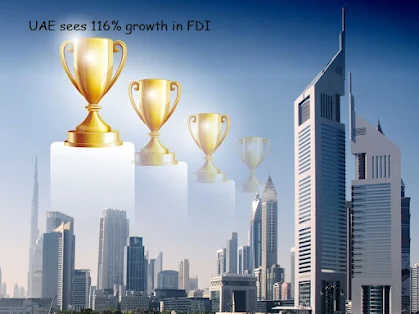The relationship between foreign direct investment (FDI) and the UAE real estate segment's growth is a complex one, but undeniably crucial for both sectors. Here's a breakdown:
Boosting market confidence: A surge in FDI signifies investor trust
in the UAE's real estate market, which further attracts other foreign investors
and buyers. This positive sentiment fuels market stability and promotes price
appreciation.
Diversification and innovation: Foreign investors often bring new
expertise, technology, and design trends to the market. This contributes to
diversification in property types, improved construction quality, and a more
vibrant real estate landscape.
Enhanced infrastructure: FDI can be channeled into developing necessary
infrastructure around real estate projects, such as transportation networks,
utilities, and leisure facilities. This improves the overall livability and
attractiveness of the areas, ultimately increasing property values.
Recent examples of FDI impact:
Dubai's
strong FDI inflows have contributed to an estimated 40,000 new homes delivered
in 2023, and similar projections for 2024 and 2025. This demonstrates the
direct correlation between FDI and increased construction activity.
Overall, the relationship between FDI and UAE real estate growth is mutually beneficial. By effectively managing the challenges and capitalizing on the opportunities, the UAE can continue to leverage FDI for robust and sustainable growth in its real estate sector.
Do you have any specific questions about this dynamic or are you interested in a particular aspect of it? I'd be happy to provide further information based on your interest.
U.A.E.
FDI Inflow: Recent Trends and 2024 Outlook
Foreign direct investment (FDI) has played a crucial role in the United Arab Emirates' economic diversification and growth, particularly in the thriving real estate sector. Let's delve into the past three years of FDI inflow into the U.A.E. and explore the expected trends for 2024:
2021:U.A.E. witnessed a significant rebound in FDI inflows after the initial shock of the pandemic, reaching AED 55.1 billion (USD 15 billion), a 54% increase compared to 2020.
This
surge was driven by several factors, including government initiatives to
attract foreign investors, the U.A.E.'s strategic location as a trade and
logistics hub, and its focus on developing non-oil sectors like tourism and
technology.
2022:The upward trend continued, with FDI inflows reaching AED 73.5 billion (USD 20 billion), marking a 33% year-on-year increase.
This
further solidified the U.A.E.'s position as a top FDI destination in the Middle
East and North Africa (MENA) region.
2023: While official figures for the entire year are not yet available, preliminary data suggests that the U.A.E. maintained its strong FDI performance in 2023.
Notably,
Abu Dhabi, the capital emirate, recorded a remarkable 363% growth in
individual-category FDI in real estate during the first half of 2023, reaching
AED 834.6 million (USD 227 million).
2024 Outlook: Experts predict that the U.A.E.'s FDI inflows will continue to grow in 2024, potentially exceeding AED 90 billion (USD 24.5 billion).
This
optimism is fueled by several factors, including:
The
hosting of Expo 2020 Dubai, showcased the U.A.E.'s innovation and
investment potential to a global audience.
The
ongoing development of mega-projects like Dubai Future District and Abu Dhabi's
Etihad Rail, are attracting significant foreign investment.
Government
reforms aimed at improving the ease of doing business and attracting talent.
Challenges and Opportunities: While the U.A.E.'s FDI outlook is promising, some challenges need to be addressed:
Overdependence
on foreign investment: The U.A.E. needs to focus on developing domestic sources
of capital to reduce its vulnerability to global economic fluctuations.
Affordability
concerns: Rapid real estate development fueled by FDI could lead to price
hikes, making housing less accessible for local residents.
To ensure sustainable growth, the U.A.E. must strike a balance between attracting foreign investors and catering to domestic needs.
Overall, the U.A.E.'s FDI story is one of remarkable success, and the future looks bright. By capitalizing on its strategic advantages and addressing potential challenges, the U.A.E. can solidify its position as a leading global investment destination for years to come.
Here are some additional insights:
Sectors
attracting FDI: Real estate, renewable energy, logistics, technology, and
tourism are major sectors attracting FDI in the U.A.E.
Source
of FDI: The U.S., the U.K., and European countries are major sources of FDI in
the U.A.E., although Asian investors are playing an increasingly important
role.
I
hope this information provides a comprehensive overview of the U.A.E.'s FDI
landscape. Please let me know if you have any further questions.



No comments:
Post a Comment